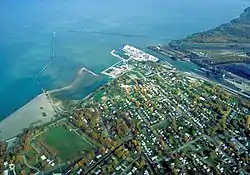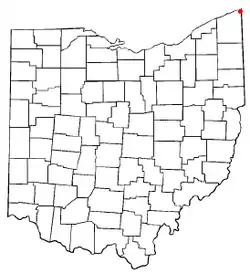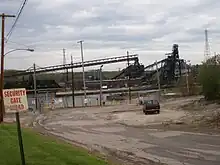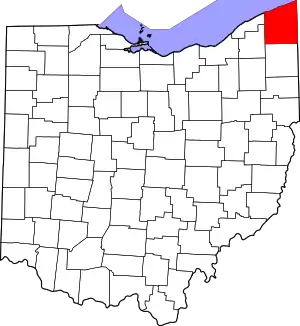Conneaut, Ohio
Conneaut (/ˈkɒniɔːt/[3] KON-ee-awt) is a city in Ashtabula County, Ohio, United States, along Lake Erie at the mouth of Conneaut Creek 66 miles (106 km) northeast of Cleveland. The population was 12,318 at the 2020 census. Conneaut is located at the far northeastern corner of the state, within the Cleveland metropolitan area.
Conneaut, Ohio | |
|---|---|
 Aerial view of the port at Conneaut | |
 Seal | |
| Motto: "Life's Just Better Here!" | |
 Location of Conneaut, Ohio | |
 Location of Conneaut in Ashtabula County | |
| Coordinates: 41°56′50″N 80°33′20″W | |
| Country | United States |
| State | Ohio |
| County | Ashtabula |
| Settled | 1799 |
| Incorporated | 1834 (village) 1902 (city) |
| Area | |
| • Total | 26.49 sq mi (68.61 km2) |
| • Land | 26.43 sq mi (68.44 km2) |
| • Water | 0.07 sq mi (0.17 km2) |
| Elevation | 646 ft (197 m) |
| Population (2020) | |
| • Total | 12,318 |
| • Density | 466.15/sq mi (179.98/km2) |
| Time zone | UTC-5 (Eastern (EST)) |
| • Summer (DST) | UTC-4 (EDT) |
| ZIP code | 44030 |
| Area code | 440 |
| FIPS code | 39-18350 |
| GNIS feature ID | 1077521[2] |
| Website | www.conneautohio.gov |
History

Conneaut is located on an old Native American trail, later used by early westbound pioneers. The word conneaut comes from the Seneca language, and has a disputed meaning.[4] A Mississauga village was located at or near Conneaut, c. 1747.[5]
In 1796, surveyors for the Connecticut Land Company built a log storehouse here, but the permanent settlement dates from 1798. In 1832 Conneaut was incorporated,[6] and was described in 1833 as having a printing office, one meeting house, two taverns, and several stores and shops.[7] It became a city in 1898.[6] Conneaut was originally named New Salem, and the parts surrounding it were named "Lakeville" from 1944 to 1964, though these were eventually combined into what is now known as "Conneaut". People still refer to parts of Conneaut as Lakeville or Amboy.[8]
On March 27, 1953, a three-train collision near Conneaut resulted in the deaths of 21 persons.[9]
Geography
Conneaut is located at 41°57′N 80°34′W (41.9433, -80.5695).[10] According to the United States Census Bureau, the city has a total area of 26.43 square miles (68.45 km2), of which 26.36 square miles (68.27 km2) is land and 0.07 square miles (0.18 km2) is water.[11] Conneaut is situated along Lake Erie at the mouth of Conneaut Creek.
Conneaut is located in the northeasternmost corner of Ohio, bordering the state of Pennsylvania to the east and has 27 square miles (70 km2) within its corporate city limits, making it the 15th-largest city in Ohio by total land area.
Conneaut is a mixture of urban areas and rural farmland. The city has over seven miles (11 km) of shoreline along Lake Erie, with beaches, boating facilities and a healthy summer tourist trade.
Climate
According to the Köppen climate classification, Conneaut has a continental maritime climate (Cfb) with warm to hot summers and cool to mild winters moderated by Lake Erie. Conneaut experiences seasonal lag due to the proximity of Lake Erie.
Demographics
| Census | Pop. | Note | %± |
|---|---|---|---|
| 1840 | 2,642 | — | |
| 1850 | 818 | −69.0% | |
| 1860 | 1,952 | 138.6% | |
| 1870 | 1,163 | −40.4% | |
| 1880 | 1,256 | 8.0% | |
| 1890 | 3,241 | 158.0% | |
| 1900 | 7,133 | 120.1% | |
| 1910 | 8,319 | 16.6% | |
| 1920 | 9,343 | 12.3% | |
| 1930 | 9,691 | 3.7% | |
| 1940 | 9,355 | −3.5% | |
| 1950 | 10,230 | 9.4% | |
| 1960 | 10,567 | 3.3% | |
| 1970 | 14,552 | 37.7% | |
| 1980 | 13,839 | −4.9% | |
| 1990 | 13,241 | −4.3% | |
| 2000 | 12,485 | −5.7% | |
| 2010 | 12,841 | 2.9% | |
| 2020 | 12,318 | −4.1% | |
| U.S. Decennial Census[12] 2018 Estimate[13] | |||
2010 census
As of the census[14] of 2010, there were 12,841 people, 4,740 households, and 3,034 families living in the city. The population density was 487.1 inhabitants per square mile (188.1/km2). There were 5,702 housing units at an average density of 216.3 per square mile (83.5/km2). The racial makeup of the city was 89.8% White, 7.5% African American, 0.2% Native American, 0.4% Asian, 0.4% from other races, and 1.8% from two or more races. Hispanic or Latino of any race were 1.8% of the population.
There were 4,740 households, of which 29.2% had children under the age of 18 living with them, 44.2% were married couples living together, 14.2% had a female householder with no husband present, 5.7% had a male householder with no wife present, and 36.0% were non-families. 30.3% of all households were made up of individuals, and 14% had someone living alone who was 65 years of age or older. The average household size was 2.37 and the average family size was 2.90.
The median age in the city was 39.6 years. 20.2% of residents were under the age of 18; 9.2% were between the ages of 18 and 24; 28.2% were from 25 to 44; 26.5% were from 45 to 64; and 15.7% were 65 years of age or older. The gender makeup of the city was 54.4% male and 45.6% female.
2000 census
As of the census of 2000, there were 12,485 people, 5,038 households, and 3,410 families living in the city. The population density was 473.4 inhabitants per square mile (182.8/km2). There were 5,710 housing units at an average density of 216.5 per square mile (83.6/km2). The racial makeup of the city was 96.33% White, 1.12% African American, 0.18% Native American, 0.47% Asian, 0.05% Pacific Islander, 0.23% from other races, and 1.61% from two or more races. Hispanic or Latino of any race were 1.06% of the population. 19.7% were of German, 16.0% Italian, 13.7% English, 12.0% Irish, 6.2% American and 6.2% Finnish ancestry according to Census 2000. There were 5,038 households, out of which 30.4% had children under the age of 18 living with them, 52.3% were married couples living together, 11.4% had a female householder with no husband present, and 32.3% were non-families. 27.9% of all households were made up of individuals, and 13.5% had someone living alone who was 65 years of age or older. The average household size was 2.45 and the average family size was 2.98.
In the city the population was spread out, with 25.2% under the age of 18, 7.7% from 18 to 24, 27.5% from 25 to 44, 22.4% from 45 to 64, and 17.2% who were 65 years of age or older. The median age was 38 years. For every 100 females, there were 94.2 males. For every 100 females age 18 and over, there were 89.4 males.
The median income for a household in the city was $31,717, and the median income for a family was $37,955. Males had a median income of $31,964 versus $21,198 for females. The per capita income for the city was $14,703. About 10.7% of families and 13.0% of the population were below the poverty line, including 20.3% of those under age 18 and 9.1% of those age 65 or over.
Economy
Major industries within the city include CSP of Ohio (formerly Venture Industries), General Aluminum (automotive parts), and CW Ohio (windows and pillars). The city's historic business district and its harbor business district are not as thriving as in the past. A few of the main businesses that anchor the downtown are Gerdes Pharmacy and Orlando Brothers grocery store. From 1944 until 2000, the Astatic Corporation was a major manufacturer of microphones. Astatic merged CAD (Conneaut Audio Devices) in 2000 which continues to produce microphones.[15] Conneaut is also home to the Lake Erie Correctional Institution, which has a total staff of 295 employees as of February 2020.[16] The port of Conneaut, Ohio is the loading point for train cars bearing iron ore for Pittsburgh area steel mills, including the Edgar Thomson Works.
Government
The city has been operated under a council-manager government since 1992.
Education
It is in the Conneaut Area City School District.[17]
Transportation
Transportation services Conneaut via Interstate 90, which bisects the city, along with an international shipping port and three railroads. U.S Route 20 also bisects Conneaut. Ohio State Route 7 has its northern terminus on Conneaut where it intersects with State Route 531.
Notable people
- Laura Boulton, eminent ethnologist, anthropologist and film-maker
- Mary L. Doe, first president of Michigan State Equal Suffrage Association
- Mildred Gillars, American radio personality (Axis Sally) during World War II, best known for her propaganda broadcasts for Nazi Germany
- Osee M. Hall, U.S. House Representative from Minnesota
- Joseph Russell Jones, appointed by Ulysses S. Grant as Minister Resident to Belgium
- Larry Kelley, football player for Yale University, second winner of Heisman Trophy in 1936
- Jean Lovell, All-American Girls Professional Baseball League player
- John P. McGoorty, Illinois judge and state representative
- Mike Palagyi, MLB pitcher for Washington Senators
- John R. Pillion, Republican member of U.S. House of Representatives from New York
- George Morton Randall, United States Army general
- Mason A. Thayer, Republican member of Wisconsin State Assembly
- Doug Tompkins, co-founder of North Face and Esprit
Gallery
 Industry related to the shipping of ores
Industry related to the shipping of ores Conneaut lighthouse
Conneaut lighthouse.jpg.webp) A modern-day playground.
A modern-day playground..jpg.webp)
References
- "ArcGIS REST Services Directory". United States Census Bureau. Retrieved September 20, 2022.
- "US Board on Geographic Names". United States Geological Survey. October 25, 2007. Retrieved January 31, 2008.
- "A Pronunciation Guide to places in Ohio -- E.W.Scripps School of". scrippsjschool.org. Archived from the original on July 25, 2017. Retrieved April 15, 2018.
- Overman, William Daniel (1958). Ohio Town Names. Akron, OH: Atlantic Press. p. 33.
- Tanner, Helen Hornbeck; Adele Hast; Jacqueline Peterson; Robert J. Surtees; Miklos Pinther (1987). Atlas of Great Lakes Indian History. University of Oklahoma Press. p. 75. ISBN 0-8061-2056-8.
- One or more of the preceding sentences incorporates text from a publication now in the public domain: Chisholm, Hugh, ed. (1911). "Conneaut". Encyclopædia Britannica. Vol. 6 (11th ed.). Cambridge University Press. p. 951.
- Kilbourn, John (1833). The Ohio Gazetteer, or, a Topographical Dictionary. Scott and Wright. pp. 160. Retrieved December 12, 2013.
- "What's With the Name!". Ohio Amish Country Marketing LLC. Retrieved March 30, 2016.
- Borsvold, David (2003). Railroading in Conneaut, Ohio. Arcadia Publishing. p. 39. ISBN 9780738523460. Retrieved December 1, 2013.
- "US Gazetteer files: 2010, 2000, and 1990". United States Census Bureau. February 12, 2011. Retrieved April 23, 2011.
- "US Gazetteer files 2010". United States Census Bureau. Archived from the original on January 25, 2012. Retrieved January 6, 2013.
- United States Census Bureau. "Census of Population and Housing". Retrieved November 21, 2013.
- "Population Estimates". United States Census Bureau. Retrieved January 23, 2020.
- "U.S. Census website". United States Census Bureau. Retrieved January 6, 2013.
- Astatic Corporation
- "Lake Erie Correctional (Alpha Version: 9.3.2.1024)". drc.ohio.gov. Retrieved February 9, 2020.
- "2020 CENSUS - SCHOOL DISTRICT REFERENCE MAP: Ashtabula County, OH" (PDF). U.S. Census Bureau. Retrieved July 31, 2023.
Further reading
- Ashtabula County Genealogical Society. 1985. Ashtabula County history, then and now : a history of the people of the county. Dallas: Taylor Publishing.
- Biographical history of northeastern Ohio : embracing the counties of Ashtabula, Geauga and Lake. 1893. Chicago: Lewis Publishing.
- Borsvald, David. 2003. Railroading in Conneaut, Ohio. Images of Rail. Chicago: Arcadia Publishing. (ISBN 978-0738523460)
- Clark, Rev. Rufus. 1880. Early History of South Ridge. Published in the Conneaut Reporter starting c. January 22, 1880; Reprint, 1985, Ashtabula County Genealogical Society.
- Large, Moina M. 1924. History of Ashtabula County, Ohio. 2 vols. Indianapolis, IN: Historical Publishing Co.
- Owens, David B. 2010. Conneaut. Images of America. Charleston, SC: Arcadia Publishing. (ISBN 978-0738577319)
- Williams, William W. 1878. History of Ashtabula County, Ohio, with illustration and biographical sketches of its pioneers and most prominent men. Philadelphia: J.B. Lippincott. (Reprint, 1974, Ashtabula Genealogical Society; 1993, Higginson Book Company)
External links
- City of Conneaut
- . New International Encyclopedia. 1905.
- . Collier's New Encyclopedia. 1921.
